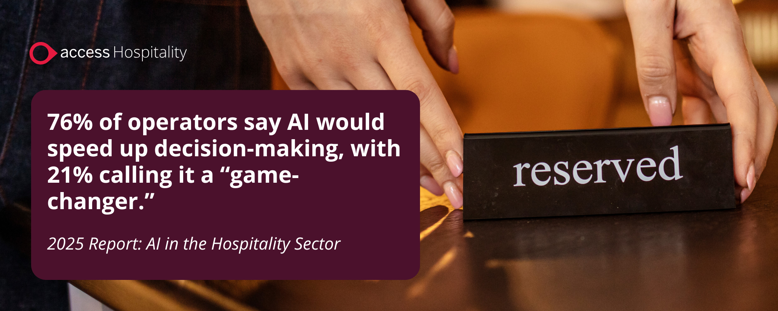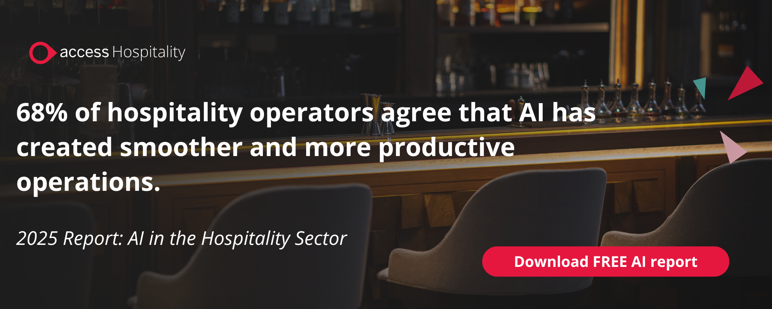
In our Hospitality Tech Trends Guide, it is reported that more than 53% of operators have adopted AI into their processes, with a further 68% agreeing that AI has created smoother and more productive operations. However, with just under half of operators not adopting AI, they could risk being left behind while others power ahead in the new age of hospitality.
In this article, we will explore the main challenges that AI adoption faces in hospitality and unpack practical solutions to solve them. You will also learn how to implement AI into your operations through 5 easy phases that will give you the best start to adopting AI tools. By using insights from our AI report which uncovers insider knowledge on AI in the hospitality industry, we will provide you with actionable advice and tools to support your AI journey.
Why AI adoption is slow in UK hospitality
The rise of AI has brought a lot of excitement and has promised more efficient and smooth-running operations for industry owners. Regardless of the benefits AI adoption brings, there are still reservations about its presence among staff and teams who you might be trying to convince. There is a certain lack of trust with AI in UK hospitality businesses, as 60% say their data is incomplete or missing according to data from our recent AI report. Of course, having data in real-time is impressive, but it needs to be accurate and consistent to be useful.
There are speculations and delays also coming from cultural resistance and generational gaps, as staff may simply not be ready to embrace AI tools and often revert to manually checking data rather than trusting the systems in place.
Sarah Jones, SHR Product Department Manager in Access Hospitality, suggests that "It’s still early days for AI in hospitality. Expectations are high, but reality takes time to catch up."
Change is always going to rock the boat, as new technology and ways of working can be daunting for teams, with concerns that integrations may fail or budgets could be maxed out. In short, AI is making good headway in the UK hospitality industry, but maybe not as fast as it should be.
What are the 7 most common hospitality barriers to AI adoption?
1. Fear of change and staff resistance
As we know, AI is quick at automating repetitive tasks that take up time and valuable resources, but this does come with some limitations at staff and organisational levels. In our AI report, it was uncovered that 53% of consumers still prefer human interaction, even though 35% believed that AI could deliver a better experience than staff. This highlights the importance of the role AI plays as it needs to enhance hospitality processes, not replace them.
2. Fragmented tech stacks and poor integration
On average, UK hospitality businesses use four separate systems to run their business operations, with 31% of operators admitting that they could use their tech more effectively, as discussed in our latest AI report. However, these hotels are more affected as around 322 hours are lost annually due to system switching, which is equivalent to 36 working days. This means fragmented technology creates more harm than it is worth as it slows down decision-making, creates data silos and fractures trust amongst teams.
3. Lack of clear ROI or measurable outcomes
With new technologies come new limitations, especially with the rapid advancement of AI. In our report, one Head of HR & Administration commented about their reserves that AI brings, suggesting that “We need to see hard evidence that AI brings positive benefits. Until then, we’re watching closely but not rushing in.” If there is a lack of ROI, then AI will still remain a grey area for many hospitality operators.
4. Fear of AI adaption to your growing business
You do have to assess the bigger picture when it comes to adopting AI into your business, especially if it is growing at a faster rate. Your AI integrations should adapt as you do, and as Calum Towers suggests in our Hospitality Tech Trend Guide, you need to ask yourself; ‘how will our AI systems adapt as our operations grow?’ ‘Will it learn and improve over time?’
5. How AI will work in your operations
It’s all well and good that AI is here to stay, but you might be wondering how it will actually work within your teams. In fact, 48% of hoteliers in our AI report agreed that integrated tech could help scale their business with a further 45% expecting AI to improve inefficiencies. The best way forward is to ask for clear and direct explanations of how AI will integrate into your operations with demos and walkthroughs that shows you the processes for utilising data and generating insights into your profits and revenue.
6. Do you have control over AI once it’s integrated?
Once AI tools are integrated into your systems, it is still important to always be in the driver's seat. A staggering 76% of operators in our AI report say that real-time consolidated data would aid faster decision-making for their business which will cut down admin time and improve data insights. Having control over system settings to monitor and adjust you AI tools will ensure your teams that AI is not a replacement but is there to enhance your operations.
7. How much of a difference AI will make for hospitality teams
The main question you will get asked by your teams is how much of an impact AI will have on making operations smoother and more efficient. New tech stacks and integrations can be overwhelming, so understanding what benefits these new processes will have on wider teams is crucial. The consensus around AI for hospitality operators is positive, as 62% agree that integrated tech can help scale businesses as well as 53% of consumers saying tech has significantly improved their hospitality experience. Requesting case studies and previous customer testimonials may put your teams at ease so you can show how AI is here to help.

How to implement AI in 5 phases across your hospitality business
Phase 1: Fix your tech fragmentation and start integrating
Reviewing your tech stack and recognising the gaps will give you the best start to introducing AI into your operations. Around 80% of UK and Irish businesses use multiple software systems, with this contributing to 13% of waste in operational expenditure across multiple venues.
What you need to do:
- Map out your current tech stack and identify any gaps and manual processes.
- Prioritise integration between your core systems, such as EPoS, CRM and staff scheduling software.
- Ensure you are fully aware of your tech stack status to start your AI journey without any setbacks.
Phase 2: Automate repetitive tasks
What AI is great for is giving you time back on manual tasks, especially when they are repetitive and dull. One Head of Systems at a London hotel said in our report that “when it comes to tasks which are repetitive and transactional, it’s better to be automated.”
How AI can help:
- Collate and batch your invoicing.
- Recognise stock gaps and automate reordering.
- Forecast ahead of time to prepare your processes.
- Reconcile payroll headaches.
Phase 3: Start to build trust in your data
We know from our data that nearly 1 in 5 businesses are not confident in their data, with 60% saying it is incomplete, and a further 50% suggesting that it is hard to trace. This mistrust could be hindering your revenue opportunities and slowing operations down.
David Esteban, Senior Product Manager in Access Hospitality, explains that “AI-powered data consolidation is turning revenue management from reactive to proactive. Instead of reviewing yesterday’s numbers across multiple dashboards, managers now get alerts that highlight anomalies and opportunities."
How AI can help:
- Consolidate and clean your data across systems.
- Create real-time dashboards to monitor all departmental operations.
- Having real-time analytics can help you make smarter decisions, with 21% of operators in our report saying it was a “game-changer”.
Phase 4: Personalise guest experiences
AI is not just about being efficient but making your operations work smarter, not harder. By personalising guest experiences, you are leveraging your data to create tailored offerings, plan stock and forecast revenue to stay ahead.
How AI can help:
- Tailor your business offerings based on previous guest behaviours and requests.
- Predict stock expectancies for events or busy periods.
- Optimise your upsell opportunities, which 56% of operators miss due to issues with stock control.
Phase 5: Get testing and make AI your own
The current of cultural resistance and lack of clarity can cloud the opinion of AI for some operators, which may decrease their success in the future of hospitality. However, around 31% agree that they could use their tech more effectively to boost sales and increase their profitability.
What to consider:
- Begin small and scale AI into your processes a little bit at a time.
- Keep your staff up to date with AI changes and onboard them with informative training.
- Don’t be afraid to hear feedback and use this to improve your processes.
Ready to overcome your hospitality AI adoption barriers?
AI is essentially just a tool that hospitality businesses can now use to help streamline processes, create real-time dashboards and help teams be more efficient. In this article, we have looked into the main barriers operators face with AI adoption and how you can overcome them in 5 easy integration phases.
Many challenges in the UK hospitality industry are down to disconnected tech stacks and poor integrations. These issues are not only disrupting your operations but can also have a knock-on effect on your team efficiency, guest experiences and revenue goals. That’s why at Access Hospitality, our suites powered by Access Evo are designed to support every stage of your AI journey from starter projects to full-scale rollouts that help you save time, improve guest experiences and make smarter decisions.
AI is now starting to become part of the norm in the hospitality sector and with Access Evo, you can be confident that those challenging gaps will finally be bridged. As David Esteban, Senior Product Manager at Access Hospitality, explains, “AI isn’t optional anymore; it’s like the weather. You can complain about the rain, or you can use it to your advantage.” Start embracing the change today with Access Evo.
Download our FREE AI implementation checklist to kick start your AI journey.

 AU & NZ
AU & NZ
 SG
SG
 MY
MY
 US
US
 IE
IE

